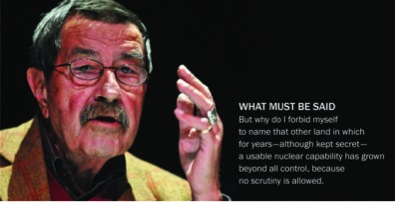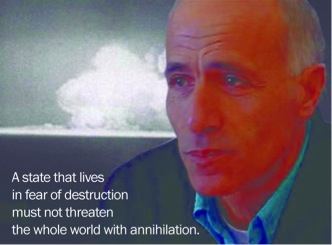by rahnuma ahmed

Gunter Grass, who won the Noble Prize for Literature in 1999, is no ‘little man.’
The press release which announced his award, stated:
[In The Tin Drum, 1959, Grass] comes to grips with the enormous task of reviewing contemporary history by recalling the disavowed and the forgotten: the victims, losers and lies that people wanted to forget because they had once believed in them” (emphasis added).
But now that Grass writes what the West’s writers and intellectuals, editors and journalists, and of course, its leaders, would rather, remained buried and forgotten in his recently-published poem “What must be said“,
The universal silence around this fact,
under which my own silence lay,
I feel now as a heavy lie
— fury hath followed.
Because the victims of whom Grass speaks are the Palestinians. Being made to `pay’ for the Holocaust, which had historical roots in Christian anti-Semitism. In “two millenia of Christian ideas and prejudices,” which provided the major basis of anti-semitism, culminating in the Holocaust (Robert Michael, Holy Hatred: Christianity, Antisemitism, and the Holocaust, 2006). It had nothing to do with the Palestininians, or Islam.
Because the state of Israel, which claims to speak for the Jews of the world, has not only been built on stolen and occupied Palestinian land — the founders say God had ‘promised’ them the land, and to think that Muslims are accused of being blind believers of the Quran! — but persists in building more and more settlements.
Grass felt compelled to write it because of Germany’s recent sale of a submarine to Israel,
whose speciality is to deliver
warheads capable of ending all life
which he fears will be used by Israel to launch,
a strike to snuff out the Iranian people
on suspicion that under his [Ahmadinejad’s] influence
an atom bomb?s being built….
If that happens, the Germans will become,
enablers of a crime, foreseeable and therefore
not to be eradicated
with any of the usual excuses
The fury is not because the poem’s “literary qualities” are doubtful (Raymond Deane, Electronic Intifada), or maybe, because it is downright “bad” (Salman Rushdie), but because it breaks the code of silence that seals lips in the West, and that of their innumerable acolytes worldwide.
The Israeli interior minister has banned Gunter Grass from entering Israel. Calls have been raised to revoke his Nobel Prize. The Hebrew Writers Association in Israel has called on the international literary community to rebuke him. He has been called an anti-Semite; dubbed a Nazi (“traces of the swastika on his clothes”), a reference to Grass having been drafted into the Waffen-SS, the combat arm of the Nazis’ paramilitary organisation, in the last months of World War II. An attack “beneath contempt” says Tariq Ali who reminds us that when Gianfranco Fini, the former Italian minister, whose party is directly descended from Mussolini’s, went to Israel and praised the Wall — which Palestinians and other peace-loving peoples of the world call the Apartheid Wall, or the Berlin Wall — “he [Fini] was forgiven his party’s past.”
The Holocaust whiplash, obviously, descends only on those who are critical of Zionism and its policies of tormenting Palestinians — Muslims and Christians, alike.
The Israeli prime minister Benjamin Netanyahu jumped into the fray. Israel cannot be compared to Iran (a “shameful moral equivalence“) because “in Iran there is a regime that denies the Holocaust and calls for the destruction of Israel.” Adding for good measure, “It is Iran, not Israel, which threatens to destroy other countries.”
While the first bit of what Netanyahu says is partly true, the second is an obvious lie. It is Israel which has repeatedly demonstrated its willingness to invade and “destroy” neighbours (Gaza, Lebanon, Syria, Egypt). It is Israel which is the only Middle Eastern nation to possess nuclear weapons; which has refused to sign the Non-Proliferation Treaty.
It is Israel which, while it damns Iran for declaring it will “wipe Israel off the map” looks the other way at the Likud Party Platform’s declaration that Palestine shall never have a state west of the Jordan.
Netanyanhu’s response is typical. When the cover story is exposed as false, the Zionists never deny but always attack and divert (James M. Wall, Veterans Today, April 8, 2012).
On the nuclear issue, Israel, on its part maintains a policy of nuclear ambiguity, supposedly for three reasons: confirmation would lead Arab publics to pressurise their own government to acquire nuclear weapons; secondly, according to US Congressional law, the government is prohibited from providing foreign aid to governments which have nuclear programmes not under international inspection; lastly, France, which had helped construct the Negev Nuclear Research Center near Dimona in the 1950s, had insisted on absolute secrecy (Yoel Cohen, Israel Affairs, 2010).
But Grass has declared that he has had enough,
[of] the West?s hypocrisy
?and one can hope that many others too
may free themselves from silence,
challenge the instigator of known danger
Challenge Israel, he did. Mordechai Vanunu, who worked as a technician at Israel’s nuclear plant in Dimona for 9 years (1976-1985), in an interview with The Sunday Times in 1986, blew the whistle on his country’s clandestine nuclear activities.
Vanunu had worked at Dimona when Israel had insisted that it would not be the first Middle Eastern nation to introduce nuclear weapons to the region (a “heavy lie”). Information and photos leaked by Vanunu disclosed that Israel had “secretly developed an extensive nuclear program, hiding its existence from the Israeli people and parliament, and the world” (Counterpunch, August 18, 2004). Vanunu claimed Israel had 150 to 200 atomic bombs, that it had started producing a hydrogen bomb and a neutron bomb.

Vanunu, then 32-years old, was lured from London to Rome, beaten, drugged and kidnapped back to Israel by Mossad; an in-camera trial sentenced him to 18 years imprisonment — more than 11 of which was solitary — on charges of having spied. He told American muckraker Eileen Fleming, “The Shin Bet, you know like the FBI and the Mossad, like your CIA were watching me. They tortured me by keeping a light on in my cell constantly for 2 years. They told me it was because they were afraid I would commit suicide, and the oppressive camera was for my safety. They recruited the guards and other prisoners to irritate me. They would deprive me of sleep by making loud noises near my cell all night long.”
Vanunu was released from prison on April 21, 2004 under strict government restrictions curtailing his speech and movement; he has since been arrested and imprisoned several times on charges of violation.
Rejecting spy charges, Vanunu wrote this poem while in Ashkelon, I reproduce it in its entirety because to me, it speaks of the best of the Nuremberg tradition, which had transformed the notion of personal culpability, making it a crime to follow the unconscionable orders of a superior. It is a scathing critique of the “big ones,” the leaders, who assume that the diligent worker, the simple mechanic — are “headless.” Vanunu overturns this by reclaiming his “conscience,” an ethical choice that landed him long years in prison, and post-prison, being denied the right to leave Israel.
I Am Your Spy
I am the clerk, the technician, the mechanic, the driver.
They said, Do this, do that, don?t look left or right,
don?t read the text. Don?t look at the whole machine. You
are only responsible for this one bolt. For this one rubber-stamp.
This is your only concern. Don?t bother with what is above you.
Don?t try to think for us. Go on, drive. Keep going. On, on.
So they thought, the big ones, the smart ones, the futurologists.
There is nothing to fear. Not to worry.
Everything?s ticking just fine.
Our little clerk is a diligent worker. He?s a simple mechanic.
He?s a little man.
Little men?s ears don?t hear, their eyes don?t see.
We have heads, they don?t.
Answer them, said he to himself, said the little man,
the man with a head of his own. Who is in charge? Who knows
where this train is going?
Where is their head? I too have a head.
Why do I see the whole engine,
Why do I see the precipice?
is there a driver on this train?
The clerk driver technician mechanic looked up.
He stepped back and saw ? what a monster.
Can?t believe it. Rubbed his eyes and ? yes,
it?s there all right. I?m all right. I do see
the monster. I?m part of the system.
I signed this form. Only now I am reading the rest of it.
This bolt is part of a bomb. This bolt is me. How
did I fail to see, and how do the others go on
fitting bolts. Who else knows?
Who has seen? Who has heard? ? The emperor really is naked.
I see him. Why me? It?s not for me. It?s too big.
Rise and cry out. Rise and tell the people. You can.
I, the bolt, the technician, mechanic? ? Yes, you.
You are the secret agent of the people. You are the eyes of the nation.
Agent-spy, tell us what you?ve seen. Tell us what the insiders, the clever ones, have hidden from us.
Without you, there is only the precipice. Only catastrophe.
I have no choice. I?m a little man, a citizen, one of the people,
but I?ll do what I have to. I?ve heard the voice of my conscience
and there?s nowhere to hide.
The world is small, small for Big Brother.
I?m on your mission. I?m doing my duty. Take it from me.
Come and see for yourselves. Lighten my burden. Stop the train.
Get off the train. The next stop ? nuclear disaster. The next book,
the next machine. No. There is no such thing.
— Mordechai Vanunu, Ashkelon Prison, 1987
In 2010, the director of the Norwegian Nobel Committee disclosed,
He [Vanunu] has written letters to us this year and last year also, where he stated explicitly that he did not want to be a candidate for the Nobel Peace Prize. The reason he gave was that Shimon Peres [currently president; twice prime minister, 1984-1986; 1995-1996] had received the Nobel Peace Prize, and Peres he alleged was the father of the Israeli atomic bomb and he did not want to be associated with Peres in any way.
? Geir Lundestad, Director of the Norwegian Nobel Institute and Secretary of the Norwegian Nobel Committee, February 24, 2010
According to Israel’s Channel 2, US officials believe Netanyahu has already decided to strike Iran (March 5, 2012).
It is good to see a great literary figure follow the lead of a little man. Hopefully, there will be many more, for, as Grass writes, “tomorrow might be too late.”
———-
Published in New Age, Monday, April 16, 2012
